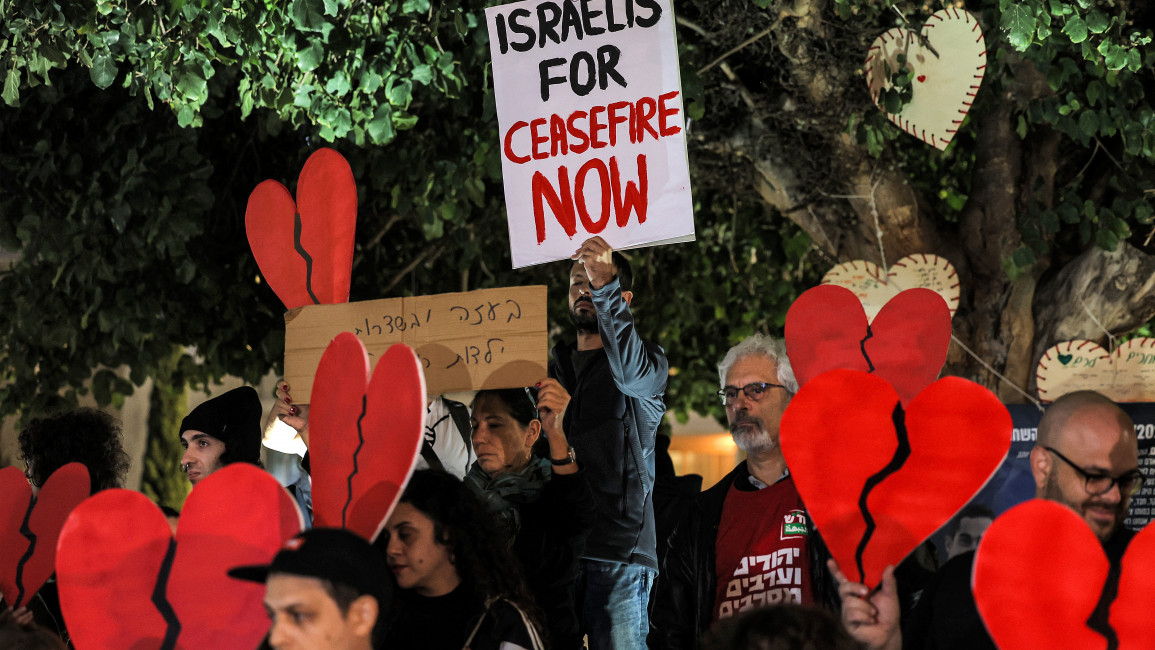
In Israel, anti-war protesters face Netanyahu's iron fist
After the 7th October Hamas attack, Israel’s citizens were reeling from the enormity of their loss. It was the worst security failure, and most costly loss of life, since the 1973 War, when 3,000 Israeli soldiers died.
Traumatised Israelis wanted revenge. There was almost unanimous support for the bombardment of Gaza, and the ground invasion that began several weeks later.
But after 133 days of unrelenting battles, the spirit in the country is beginning to shift, just as it did after similar invasions in Lebanon in 2009 and Gaza in 2014.
As much as the public blames Hamas for its attack, it blames Prime Minister Netanyahu for the security lapse that permitted the tragedy. Many Israelis do not trust his assertion that the army must fight on till “total victory” and Hamas is “annihilated.”
"Israel has shown itself to be a country that no longer values human life, not even its own"
This may be what Israelis want, but they are clear-eyed enough to know that what they want and what is possible are not the same.
The war has also exacted a heavy toll on the Israeli occupation forces (IOF). 550 IOF soldiers have been killed, and 20% of the 230 who died since the Israeli invasion were killed by friendly fire.
Between 10-15,000 have been injured according to the Friends of Disabled Soldiers. Many of the wounded face permanent, severe disabilities requiring years of rehabilitation and treatment. Israelis are only now beginning to come to terms with such staggering losses.
But even as public perception starts to shift, and support for the war begins to diminish, there is little semblance of an organised anti-war movement in Israel.
Even with all its military might, Israel's campaign to 'destroy Hamas' and defeat Palestinian resistance is unfeasible.
— The New Arab (@The_NewArab) January 29, 2024
Israel is fighting a losing battle against Hamas in Gaza
🖋️ @emadmoussahttps://t.co/q29LWoqydN
Hostage families at the forefront
Some of the most powerful voices pressuring the government to pursue diplomatic negotiations come from families of those still held hostage by Hamas in Gaza, who urge the Israeli government to sit down and negotiate for their loved ones’ release.
But Netanyahu has thus far refused to do so, recently rejecting a Hamas ceasefire offer, calling it “delusional.” He has instead stuck by his assertion that Hamas must be eliminated, no matter the cost.
There are even those who advocate sacrificing the lives of the hostages in order to free the army to completely obliterate Gaza and destroy Hamas. An Israeli reporter for Yediot Achronot aired those views on Israeli TV.
Israel has shown itself to be a country that no longer values human life, not even its own.
Two weeks ago, a group of hostage families began a vigil at Netanyahu’s home until their loved ones are released. Weekly protests in Israel demand a hostage release and that Netanyahu resign, with calls growing stronger week after week.
In response, Netanyahu has attacked the hostage families, accusing them of aiding Hamas. Not only is this insulting to those who’ve endured this suffering, it confirms their movement is having an impact on his ever-sinking popularity.
An early January Israeli poll found that only 15% wanted Netanyahu to remain in office. An earlier November poll showed 29% wanted him to resign immediately, 47% wanted him to resign after the war. Only 18% favour him continuing to lead the government.
Even before 7th October, Netanyahu was on thin ice, and his popularity has reached an all time low. The almost universal belief is that there will be elections after the conclusion of the war.
If Netanyahu refuses, the year-long protests against his judicial coup will almost certainly resume until he resigns. He will no doubt cling to power until the bitter end.
"Even if a powerful anti-war movement were to materialise in Israel, its unclear what - if any - impact this will have on Netanyahu's plans to continue the war"
Attacking the anti-war movement
For those that dare speak up against Israel’s war, let alone the occupation, they face extreme suppression. Anti-war activists face threats and violence, not just from fellow citizens, but from the police itself.
The far-right, represented by security minister Itamar Ben Gvir, have cracked down on anti-war activism. Hundreds of Israelis and Palestinians have been arrested for showing support for Gaza on social media.
Last month, a leading Knesset member from the left-wing Hadash Party, Ofer Cassif, announced his support for the Gaza genocide case brought before the International Court of Justice (ICJ), which ruled that there was prima facie evidence that Israeli had committed genocide.
In response, Knesset members resolved to seek a measure of revenge against Cassif for what they see as his betrayal. A legislative subcommittee took the unprecedented step of voting to expel him. The 14-2 vote wasn’t even close. Now the case goes before the entire Knesset, where no MK has ever been impeached.
Conscientious objectors
After the 1967 War, a movement to refuse Israel’s mandatory military service in protest against the occupation began. Since then, young people have continued to regularly announce their moral objections to service.
The army is an almost sacred national institution, and refusal comes with a heavy punishment. Not only does the refuser face pariah status, they face repeated prison sentences and court martials.
In the past few months, tens of young Israelis have refused to serve in the IOF. One recent example is Tal Mitnik, who refused to serve due to opposition to the Gaza war:
“I believe that slaughter cannot solve slaughter,” he said. “The criminal attack on Gaza won’t solve the…slaughter that Hamas executed. Violence won’t solve violence. And that is why I refuse,” he explained.
In reality, though, conscientious objectors and anti-war activists represent a very small minority of the Israeli population. In response to the military’s call, nearly 300,000 reserve soldiers have reported for duty to join Israel’s war on Gaza.
Even opposition leaders within the government have joined forces. Shortly after Israel invaded Gaza, two key Opposition leaders, Benny Gantz and Gadi Eisenkot (both former IDF chiefs of staff), joined the war cabinet.
Though they have criticised Netanyahu’s prosecution of the war, they’ve not broken with Netanyahu. Nor have they criticised the war itself: in Israeli politics, opposing a war is a political death sentence.
Even if a powerful anti-war movement were to materialise in Israel, its unclear what - if any - impact this will have on Netanyahu’s plans to continue the war.
An entire country wants the prime minister to go. Yet he ignores them. Netanyahu has an ironclad grip on his coalition partners. Either they are afraid of him, or they are afraid of the drubbing they expect in the next election.
None of his MKs will jump ship and bring down the government. They care more for the trappings of power than the will of the people. In this case, not even hundreds of thousands of protesters in the streets can topple this government.
Their voice counts for nothing.
Richard Silverstein writes the Tikun Olam blog and is a freelance journalist specialising in exposing secrets of the Israeli national security state. He campaigns against opacity and the negative impact of Israeli military censorship.
Follow him on Twitter: @richards1052
Have questions or comments? Email us at: editorial-english@newarab.com
Opinions expressed in this article remain those of the author and do not necessarily represent those of The New Arab, its editorial board or staff.




